The IRS has issued guidance on the denial and revocation of passports due to serious tax delinquency. The IRS must notify the State Department when an individual has a “seriously delinquent” tax liability. Generally, after receiving such a notification, the State Department will deny an application for a new or renewed passport.
The State Department may also revoke or limit a previously issued passport. The IRS and the State Department will begin implementation of these rules in January 2018.
[This article first appeared on the Wolters Kluwer blog.]
Background
Code Sec. 7345 was enacted as part of the FAST Act (P.L. 114-94) on December 4, 2015. A seriously delinquent tax debt is an unpaid, legally enforceable, and assessed federal tax liability greater than $50,000 and for which:
- The IRS has filed a notice of federal tax lien and the individual’s right to a hearing has been exhausted or lapsed, or
- The IRS has issued a levy.
The federal tax debt is the aggregate of all current tax obligations, including penalties and interest. However, a “seriously delinquent tax debt” does not include a debt that is currently being paid under:
- An approved installment agreement,
- An approved offer in compromise, or
- A settlement agreement with the Justice Department.
Moreover, a debt is not a “seriously delinquent tax debt” if collection is suspended because the taxpayer:
- requested a Collection Due Process hearing, or
- made an innocent spouse election or requested innocent spouse relief,
Serious Tax Delinquency
The State Department will not be notified if one of the exceptions to seriously delinquent tax debt applies. In addition, the IRS will reverse a certification when the tax debt no longer qualifies as a seriously delinquent tax debt. The State Department must remove the certification from the individual’s record after it receives notice that the IRS has reversed a certification. Therefore, taxpayers notified that their tax debt has been certified should consider:
- paying the tax owed in full,
- entering into an installment agreement, or
- making an offer in compromise.
Generally, the State Department will provide a certified applicant with 90 days to resolve the tax delinquency before denying the application. Accordingly, individuals who need a passport to travel within 90 days must resolve the tax delinquency within 45 days of their passport application date.
Sole Remedy
A taxpayer’s sole remedy for a wrongful certification or failure to reverse a certification is to file a civil action under Code Sec. 7345(e). The individual may not go to IRS Appeals to challenge the certification or the decision not to reverse. However, a taxpayer who believes the certification is wrong can call the number on the Notice CP508C to request reversal.
Thanks for reading CPA Practice Advisor!
Subscribe Already registered? Log In
Need more information? Read the FAQs



